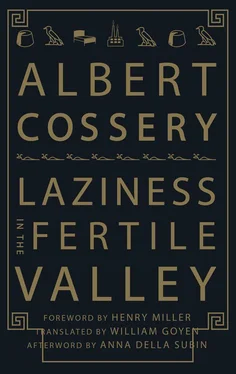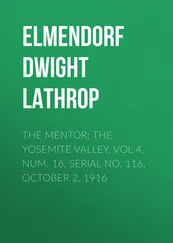Albert Cossery - Laziness in the Fertile Valley
Здесь есть возможность читать онлайн «Albert Cossery - Laziness in the Fertile Valley» весь текст электронной книги совершенно бесплатно (целиком полную версию без сокращений). В некоторых случаях можно слушать аудио, скачать через торрент в формате fb2 и присутствует краткое содержание. Год выпуска: 2013, Издательство: New Directions Publishing Corporation, Жанр: Современная проза, на английском языке. Описание произведения, (предисловие) а так же отзывы посетителей доступны на портале библиотеки ЛибКат.
- Название:Laziness in the Fertile Valley
- Автор:
- Издательство:New Directions Publishing Corporation
- Жанр:
- Год:2013
- ISBN:нет данных
- Рейтинг книги:3 / 5. Голосов: 1
-
Избранное:Добавить в избранное
- Отзывы:
-
Ваша оценка:
- 60
- 1
- 2
- 3
- 4
- 5
Laziness in the Fertile Valley: краткое содержание, описание и аннотация
Предлагаем к чтению аннотацию, описание, краткое содержание или предисловие (зависит от того, что написал сам автор книги «Laziness in the Fertile Valley»). Если вы не нашли необходимую информацию о книге — напишите в комментариях, мы постараемся отыскать её.
Laziness in the Fertile Valley — читать онлайн бесплатно полную книгу (весь текст) целиком
Ниже представлен текст книги, разбитый по страницам. Система сохранения места последней прочитанной страницы, позволяет с удобством читать онлайн бесплатно книгу «Laziness in the Fertile Valley», без необходимости каждый раз заново искать на чём Вы остановились. Поставьте закладку, и сможете в любой момент перейти на страницу, на которой закончили чтение.
Интервал:
Закладка:
that enveloped her, she seemed shrunken; her face, unskillfully painted, looked like the image of a candy doll. She had been waiting, peaceful and resigned, but when she saw Serag she ran to meet him.
“What made you drag like that?” said Serag. “By Allah! I thought we’d never finish dinner.”
“I did my best,” said Hoda.
“Well, let’s go,” said Serag.
“Kiss me first,” said Hoda.
Serag kissed her, then took her hand and they started down the road. First they walked rapidly, then, little by little they slackened their pace, stopped for a moment, looked at each other and smiled. The night was clear, and the sky resplendent, spilling over with stars so real and so close that it seemed one could pluck them like ripe fruit. A fresh wind swept the countryside, bringing the odor of herbs and, from the distance, the acrid and violent odor of the great city. Serag breathed this wind of conquering liberty with delight. He felt it on his face; he felt it on his hands, and it seemed to revive him as though he had just come out of a grave. An immense joy floated through him; he turned to the young girl.
“Are you happy?” he asked.
‘Yes,” Hoda said. “I’m happy to be with you.”
“At last, I’ll be able to work,” Serag said.
He was exulting in the thought of the effort he was about to undertake. He was going to share the destiny of humanity and participate in the boiling energies that governed the world. His life would be sterile no longer. A daring existence, full of the unpredictable, awaited him. He was impatient to get to the city.
“Try to find a job that isn’t too tiring,” said Hoda.
“Why, girl? On the contrary, I’ll look for the most difficult work.”
“You’ll get sick.”
“I won’t get sick. What do you take me for, girl? I can do any kind of work.”
Hoda reflected.
“You could be a cab driver,” she said.
“No,” said Serag. “That isn’t a serious job.”
“It’s very serious and, at the same time, very amusing,” said Hoda. “All day long you only have to run around in a car. You could take me along with you.”
“Be quiet,” said Serag. “I don’t want to. It’s not serious at all. You call that a job; to sit down all day driving a cab. I want real work, do you understand?”
“It’s too bad,” said Hoda. “You could have taken me with you. I’m so fond of driving in a car.”
“What are you thinking about, girl? Let’s be serious. We aren’t here to amuse ourselves.”
“So much the worse,” said Hoda. “Do what you like.”
They had just passed the last houses and now found themselves alone on the road, surrounded by the vast countryside and the threatening sounds of distant perils. Serag looked at the road in front of him; it lost itself in infinity, a long line of flickering street lamps. He slackened his pace and seemed to hesitate before the enormous effort of accomplishment. His exaltation had suddenly disappeared and he began to feel a treacherous regret in the depths of his heart. The warm peacefulness of his father’s house, from which he had just fled to run after tempting adventures was still too attached to his whole being for him to forget it easily. The subtle threads, made of torpor and the inexpressible joys of sleep, held him to the destiny he wished to betray. He had been insane to think he was different from them, and pledged to the grotesque and boring efforts of men. All that was nothing but puerile vanity. He began to think with terror of the evil pitfalls of the great city.
First there were the factories where one must go to work at four in the morning; Serag shivered at the thought. There were the streetcars, those sinister streetcars that ran at breakneck speed, heedless of the people they crushed. And then, there was the government. What if the government arrested him and threw him in prison? This upset him most of all. The government, his father had told him, arrested rebels. But was he a rebel? Was his desire to look for work and to mingle with working men a revolutionary act? Serag didn’t understand why his love of an active life should be considered by the government as an attempt at revolt against the established laws. It seemed very strange to him.
The thought of the policemen made him sick. Suddenly he felt weak; his head was spinning. He stopped and looked at the young girl for a moment.
“It’s still far,” he said. “Should we stop a moment?”
“All right,” Hoda said. “Are you tired already?”
“A little,” Serag admitted. “Let’s sit down here for a minute. Only for a minute.”
They sat down on the side of the road, and Serag closed his eyes. No car passed on the highway; the silence was almost total. There was nothing but the almost imperceptible sound of the ditches, carrying their dirty waters across the fields swallowed up by the night.
“Do you think we’re very far from the house?” Serag asked.
“No,” said Hoda. “Do you want to go back?”
“I don’t know,” said Serag. “First I want to sleep for a minute.”
“As you wish,” Hoda said.
Serag gave a long yawn; Hoda looked at him and began to yawn also. Then they leaned against each other and fell asleep, indifferent to the furious labour of men, under the peaceful gaze of the idle stars.
AFTERWORD: GOD IS WITH THE LAZY
The lazybones attracts all the waves of the sea. “Let me sleep,” he begs, “so nice and warm under my white sheets and blue blankets.” And would you believe it? The sun’s on his side.
— Edmond Jabès, 1945Fasten a mast to the bed, let the sheets catch the wind. It is possible that, if you drift long enough on the waves of sleep, you will awaken into a world that has changed — though who can say for the better? The Greeks told of the boy Epimenides, who was searching for his father’s stray sheep when he stopped for a noonday nap in a cave. When he awoke, fifty-seven years later, everything that he once knew had vanished. Across Crete, news spread that Epimenides must be particularly loved by the gods to have slept so long. For Aristotle, he was proof of the impossibility of the passage of time without the occurrence of change.
Christian martyrs have dozed longer still. The eighteenth chapter of the Quran — and an earlier Syriac legend — tells of a group of young Christian men who, fleeing the persecution of a Roman Emperor, escaped into a cave, where they slumbered for three hundred and nine years. Rising from their long sleep, they found their beards had grown long, Christ’s name was openly spoken, and all of their loved ones were dead. In 1933, the Egyptian playwright Tawfiq al-Hakim dramatized their swim through the oceanic night in The People of the Cave . Awakening into a world where they are hailed as saints, the stiff-limbed sleepers find they cannot live in this strange, undreamt future. “We are like fish, whose water has changed from sweet to salty,” the saints protest, as they retreat into their cave.
Languishing in a French prison in 1883, Paul Lafargue observed that a strange mania had lately gripped mankind. It seemed everyone had begun to worship what their God had damned. In their canonization of work — that vampire sucking the blood of modern society — they had forgotten His sublime example. Did He not toil for six days, then rest forever after? In his treatise The Right to Be Lazy , Lafargue intoned a prayer: “O, Laziness, have thou mercy upon this eternal misery! O, Laziness, mother of the arts and the noble virtues, be thou balsam for the pains of mankind!”
Enter the catatonic heroes of Albert Cossery’s Laziness in the Fertile Valley , exercising their right to do nothing. In a dilapidated villa in the Nile Delta, a family sleeps all day, rising only for meals. The cadaverous Galal, oldest of three brothers and friar of somnolence, staggers into the dining room in a dirty nightgown. Some say he is an artist. “Why are you awake?” he cries in abject horror. His uncle and brothers are gathered around a pot of lentils at the table. The youngest, Serag, secretly dreams with eyes half-closed of freeing himself from the familial inertia and doing the unthinkable — finding a job — perhaps in the factory being constructed nearby. But on his exploratory walks (he cannot help but fall asleep on the way), he finds the rusted heap forever unfinished. Their father, Old Hafez, never descends from his bedroom, yet hatches a controversial scheme to take a wife in his old age. Rafik, the middle son, must keep vigil during the siesta to kill the matchmaker conspiring to bring such an enemy of sleep into their den. Forced to stay awake, Rafik is fighting against the current in a dangerous river. “From time to time, in a supreme effort, he managed to free himself, he raised his head and breathed deeply,” Cossery writes. “Then, again, he found himself plunged into the depths of an annihilating sweetness. The waves of an immense, seductive sleep covered him.”
Читать дальшеИнтервал:
Закладка:
Похожие книги на «Laziness in the Fertile Valley»
Представляем Вашему вниманию похожие книги на «Laziness in the Fertile Valley» списком для выбора. Мы отобрали схожую по названию и смыслу литературу в надежде предоставить читателям больше вариантов отыскать новые, интересные, ещё непрочитанные произведения.
Обсуждение, отзывы о книге «Laziness in the Fertile Valley» и просто собственные мнения читателей. Оставьте ваши комментарии, напишите, что Вы думаете о произведении, его смысле или главных героях. Укажите что конкретно понравилось, а что нет, и почему Вы так считаете.












